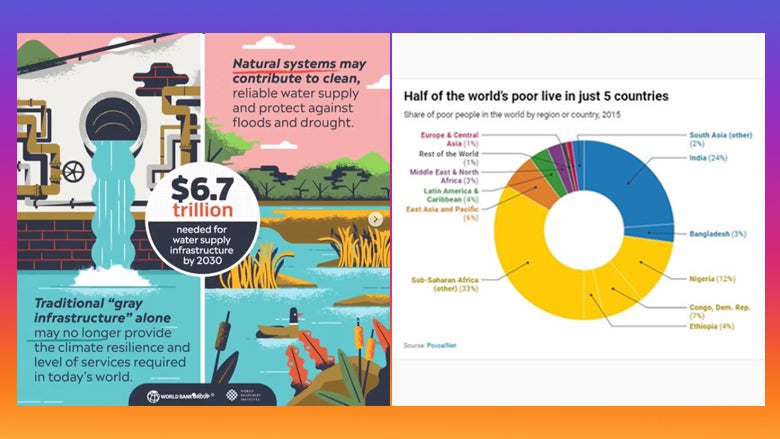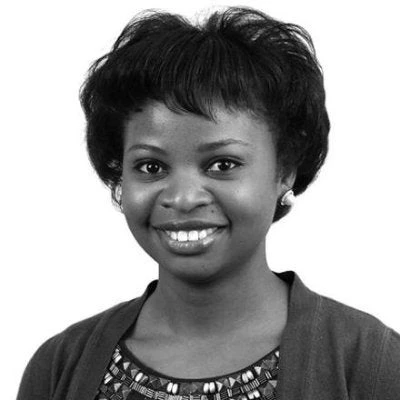 © World Bank
© World Bank
What do solar panels, biodiversity, Nobel Prize winners and world population have in common? In 2019 these were some of the topics that generated the most interest by you on our social media channels.
In general, it appears that the overall themes you engaged with the most were around human development. It’s also clear that when we post content that reflects the times we are living in and the challenges that we are facing in global development, you are even more engaged. This inspires us to work even harder towards alleviating poverty. As we move into 2020, what are some of the topics you would like to see more of? Let us know in the comments section below!
LinkedIn continues to rise as an intellectual development conversation hub
LinkedIn has been one of our fastest growing and most engaging channels. But despite that track record, we were surprised to see how many of you participated in the fun interactive quiz we created as a way to test your development knowledge during the Annual Meetings. Typically, LinkedIn users gravitate towards competitions, job postings, contests, Massive Open Online Course (MOOCs), publications and reports, or general educational content. So, when we shared the post below to find out how many of you rate yourselves as geniuses when it comes to development, we were encouraged to see over 300 of you engage with it and some even left comments on their user experience. For instance, Jesse Nyokabo shared his score, saying: 8/9 Looking forward to making an impact. Jesse, we are glad to know that our quiz inspired you! Did you miss the quiz? See the post below and find out what your score will be!
In one way or another, we are all trying to deal with today’s critical economic challenges. This year, Nobel Prize winners Abhijit Banerjee and Esther Duflo gave us hope in their new book “Good Economics for Hard Times," which discusses cutting-edge research in development economics. We posted about the successful book launch on LinkedIn and we received over 900 of your reactions including several comments such as Nancy Wiggins who said, Thank you for your excellent and timely research. You too have a chance to see the book launch event replay and share your comments, below.
Twitter remains pithy but reflective of the times
We all know that no country, community, or economy can achieve its potential or meet the challenges of the 21st century without the full and equal participation of women and men, girls and boys. Why then does employment sex segregation still exist? We asked this question on our Twitter channel and judging from the 497 retweets and 8,700 likes of the post, it was good to know that you too agree that gender equality is good for development.
Why does employment sex segregation still exist? The problem stems from a multitude of reasons that can be grouped into three buckets:
— World Bank (@WorldBank) July 11, 2019
Labor supply
Labor demand
Legal and policy environments
Learn more: https://t.co/tmy75F8xcT
It’s no secret that education, and the human capital it creates, delivers large, consistent returns. It also reduces inequality, drives long-term economic growth and spurs innovation. Earlier this year, when we posted how countries that took education seriously, have accelerated development and prosperity, you strongly agreed with over 700 retweets and 6,900 likes. Phelisters Wegesa replied to the tweet and said, Thanks quoting World Bank’s Vice President for Human Development Annette Dixon’s statement which said: 'Youth deserve to be equipped with the skills they need to thrive in an increasingly demanding and uncertain job world. Today’s students will be tomorrow’s citizens and leaders, a good relevant education is essential to turn aspirations into reality.” See more of your reactions:
Countries that have accelerated development & prosperity all share one common characteristic --- they took #education seriously and invested appropriately: https://t.co/Qs8yWEhyJU #InvestInPeople #EducationDay pic.twitter.com/lgCVkbOls4
— World Bank (@WorldBank) January 24, 2019
Our Facebook commentary becomes more meaningful
In April this year, World Bank Group’s President David Malpass went on his first trip to Africa and shared his reflections with us. We posted about his trip to Madagascar, Mozambique, Ethiopia and Egypt on our Facebook page and received an overwhelmingly positive response from many of you. Your support (in over 9000 likes, 79 comments and 72 shares) for the President’s message on achieving good development outcomes from country level programs is well acknowledged, and if you missed the post, here it is again:
Did you know that the world’s population will continue to grow and will reach nearly 10 billion by 2050? When we shared this informative post on Facebook, a lot of you, in fact, 6,500 of you liked it, 979 of you shared it, while 249 of you responded constructively. For instance, Daniel Tirado wrote in the comments: Africa is going to have the most mega cities in the future. And you are right Daniel, Africa is the youngest continent in the world and it’s where we are seeing some of the population explosion. See the rest of the growth trends.
Instagram was all about trying new things
Video is the future of Instagram and early this year, we jumped on IGTV. Our first IGTV video was about Concentrating Solar Power (CSP) in Morocco. Instagrammer @see.n.c.m.see said “Innovation is limitless and it's encouraging to see how to utilize resources like a desert. I would love to watch more videos on innovations on climate action, like water harvesting, especially in dry arid areas.” The 53,000 views and 143 comments reflect your collective interest on innovation, technology and effort to bring clean and reliable energy to those who need it most. View full post here.
We also tried to mix things up on our posts. On Biodiversity Day, our 15-second video of a family of elephants caught your attention. It got over 20,000 views, 160 shares and 156 saves. @luksiktech said “...humans should also consider how to live with wildlife while developing their cities.” And we agree! It is not just an issue for wildlife but also the security of people living near protected areas. The Global Wildlife Program (GWP) is working with governments to improve protected area management and reduce human wildlife conflict. Your responses to this post are reassuring that we can work together to save these beautiful animals from extinction.
We also posted more infographic-style images about our data and other information on development topics you care about. These two posts combined have 817 shares, 1,505 saves, and 181 comments. We’ll make sure that we create more posts like these that serve as a good resource to add to your Instagram Collection. View them in detail here and here.
Did you know that we have our own Instagram stickers? A good number of you do! During our Annual and Spring Meetings, we wanted to draw attention to important themes we we’re highlighting for the year such as Investing in Human Capital, Global Economy and Climate Change. You viewed our stickers over 100,000 times. You can use them any time of the year on your Instagram Stories. Just type “endpoverty” or “worldbank” in the search tab of IG stories to find them.
For next year, we’ll try Instagram’s new features to create more dynamic posts and continue to engage with you on this growing platform.
World Bank stickers on Instagram Stories – Urgency, Inclusion and Sustainability
YouTube was our platform for in-depth discussions and storytelling
Video is a powerful tool to support our passions and inspire us to have positive social impact in our communities. When we reached 100,000 subscribers, we further realized the unprecedented potential to engage a wider a community on YouTube for social positive change and amplify the voices of people in the countries we empower.
This year, our top videos came from a 24-hour live program featuring economists talking about global development and solutions to pressing challenges for each region. It seemed impossible but when hundreds of you expressed your excitement about the initiative, what was left was to put the hypothesis to work. And it did! You engaged with these two videos from our regions the most, getting over 15,000 hours of watch time.







Join the Conversation